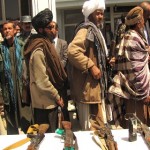The Afghan government’s talks with the Taliban on July 7 – the first of their kind in recent history – are a vindication of President Ghani’s risky policy of outreach to Pakistan and China, whose support has been instrumental in bringing the Taliban to the negotiating table. As negotiations proceed, however, the negotiating parties should be conscious of the role of the region’s other major power, India, which has been notably absent in recent discussions. In the long-term, a sustainable peace in Afghanistan will be difficult to achieve without New Delhi’s cooperation.
Historically, China’s role in Afghanistan has been consistent with its broader foreign policy doctrine of non-interference in the domestic affairs of other countries. This changed markedly in March 2015, when Beijing offered to broker talks between the Ghani government and the Taliban. This ambitious move suggested that China sees itself as an important stakeholder in the security and prosperity of Afghanistan.
The following month, President Xi Jinping’s visit to Islamabad provided an opportunity for bolder action. By leveraging their longstanding political relationship, support for Pakistan’s civilian nuclear power sector, promises of massive state-led investment into Pakistan’s underdeveloped infrastructure– much of which coming under the auspices of Xi Jinping’s ‘China-Pakistan Economic Corridor(CPEC)’– Beijing has reportedly been successful in persuading the Pakistani government to apply pressure on its Taliban clients. The aim is to force the predominant factions within the Taliban to enter into negotiations with the Ghani government over a power-sharing agreement.
In the midst of these recent diplomatic efforts involving Afghanistan, Pakistan and China, India has been notably quiet. It is no secret that India is against any power sharing deal with the Taliban, especially one that would see changes to Afghanistan’s constitution or the appointment of Taliban legislators. India’s leadership see little practical difference between Mullah Omar’s representatives and the terrorists who have targeted Indian interests for decades. As such, recent comments by Afghanistan’s Deputy Foreign Minister, Hekmat Karzai, that ‘everything and anything could be discussed’ at the peace talks will be met with alarm in Delhi.
Does this matter?
India has consistently played a constructive role in Afghanistan. As one of the largest bilateral providers of aid (around $2 billion over the past decade) it has contributed to the on-going reconstruction efforts in Afghanistan. Indian state owned firms own and operate major projects such as an iron ore mine in Bamyan Province and a hydroelectric dam in Herat. India is funding the construction of the new parliament in Kabul, which will be completed later this year. India’s military is also assisting in capacity building for the ANSF by training Afghan officers on Indian soil. While Delhi once armed the Northern Alliance during the Taliban decade, it has avoided meddling in Afghanistan’s current reconciliation process, favouring instead an ‘Afghan-led, Afghan-owned’ solution.
Should Pakistan open its roads and railways to transcontinental trade from Afghanistan, India will be a major end market – it is already the second largest export destination for Afghan goods. Afghan produce such as fruit, minerals, and spices are already making their way to India from Afghanistan. However, progress has been slow because of Pakistan’s refusal to allow its territory to be used as a trade thoroughfare to India. The potential economic benefit to Afghanistan should this pathway be opened is significant.
If Indian initiatives in Afghanistan are to be maintained, and if New Delhi is to continue playing the role of a responsible player, more needs to be done to take New Delhi’s concerns into account. India does not see its stake in Afghanistan as a zero-sum competition with Islamabad; however, the prospect of a Pakistani-backed government in Kabul – with significant Taliban representation – is a cause of deep concern.
As a major facilitator of recent discussions between Afghanistan and Pakistan, China can play a role in assuaging India’s concerns – a role that it previously played through shuttle diplomacy between India and Pakistan following the Mumbai attack in 2008. With the next Heart of Asia process set to be held in Islamabad at the end of this year, China could use the opportunity to encourage greater trade between India and Afghanistan, and highlight New Delhi’s role in the country’s development. And with India leading the Process’ trade, commerce and investment track, China has every reason to do so.
In encouraging a robust Indian role in the Shanghai Cooperation Organisation, and assisting in a speedy implementation of the TAPI pipeline project, Beijing can help India’s political and economic integration into Afghanistan and Central Asia further.
If Afghanistan is to remain a viable, prosperous state, it will need the full support of neighbouring states, and access to the trade and investment opportunities that they can provide. The immediate challenges that the peace talks present should not distract attention from the longer term goal of connecting Afghanistan to a peaceful, prosperous region.
Edward Schwarck is a Research Fellow in Asia Studies at the Royal United Services Institute in the UK
This article was exclusively written for Gateway House: Indian Council on Global Relations. You can read more exclusive content here.
For interview requests with the author, or for permission to republish, please contact outreach@gatewayhouse.in.
© Copyright 2015 Gateway House: Indian Council on Global Relations. All rights reserved. Any unauthorized copying or reproduction is strictly prohibited


